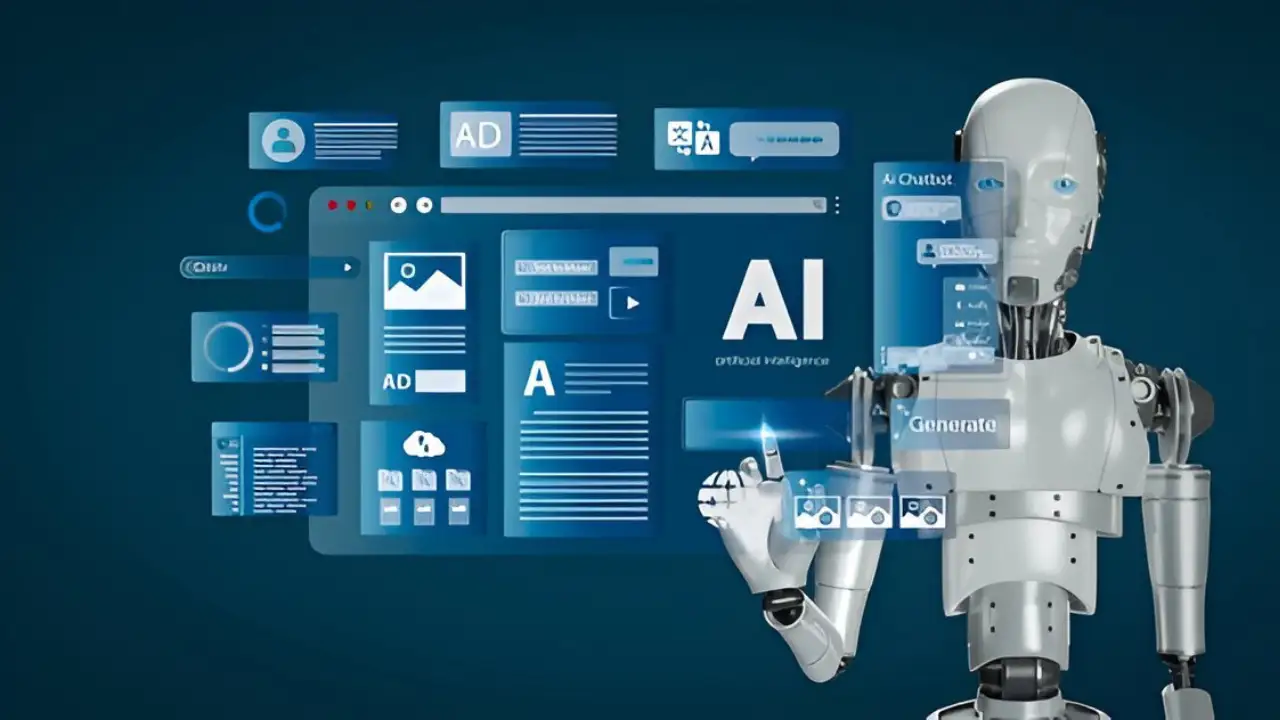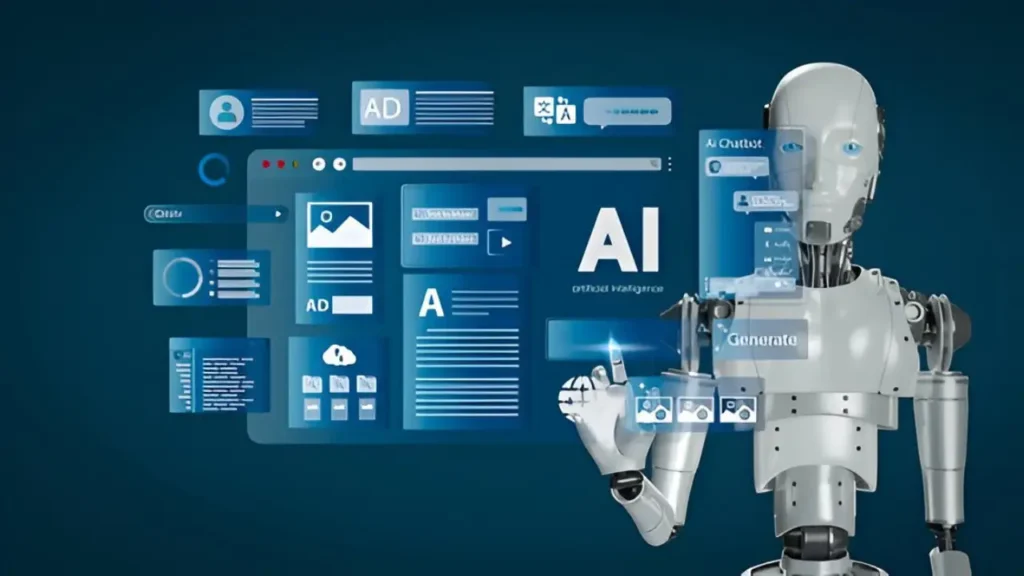The digital landscape is evolving at breakneck speed, and artificial intelligence (AI) is at the forefront of this transformation. As we navigate the intricate web of technological advancements, a golden opportunity emerges for those keen on leveraging AI to generate income online. This comprehensive guide delves into the myriad ways you can harness the power of AI to create lucrative revenue streams, offering insights that cater to both novices and seasoned digital entrepreneurs.
My extensive research and hands-on experience with various AI tools have revealed a treasure trove of possibilities. From content creation to sophisticated data analysis, AI is revolutionizing how we approach online business and freelance work. Let’s embark on this journey to discover how you can turn AI into your personal money-making machine.
The AI Revolution in Making Money Online
The integration of AI into our daily lives and business operations has opened up unprecedented avenues for income generation. Gone are the days when making money online was limited to a select few with specialized skills. Today, AI democratizes the playing field, allowing individuals from diverse backgrounds to tap into lucrative opportunities.
AI tools have become increasingly sophisticated and capable of performing tasks that once required years of training and expertise. Whether you’re a creative professional, a data enthusiast, or someone with a knack for problem-solving, there’s an AI application that can amplify your skills and help you monetize your talents.
The beauty of using AI for online income lies in its scalability and efficiency. These tools can handle repetitive tasks at lightning speed, freeing up your time to focus on strategy and creativity. Moreover, the learning curve for many AI applications is surprisingly gentle, making them accessible to those without a technical background.
As we delve deeper into specific AI-powered money-making strategies, keep in mind that the key to success lies in finding the right balance between human creativity and machine efficiency. The most successful entrepreneurs in this space are those who leverage AI as a powerful ally rather than a replacement for human ingenuity.
You May Also Like: The Top AI Tools for Small Businesses to Boost Efficiency
Content Creation: The AI-Powered Goldmine
Content is king in the digital realm, and AI is revolutionizing how we create, optimize, and distribute it. Let’s explore how you can leverage AI tools to become a content creation powerhouse and monetize your digital presence.
Writing with AI: Beyond Basic Text Generation
AI writing assistants have come a long way from simple text completion. Today’s advanced tools can help you craft compelling narratives, develop intricate plotlines, and even adapt your writing style to different audiences. Here’s how you can make money with AI-assisted writing:
- Blogging and Article Writing: Use AI to generate ideas, create outlines, and even draft entire articles. Tools like Jasper.AI and GPT-3 can help you produce high-quality content at scale, perfect for maintaining a profitable blog or offering freelance writing services.
- Copywriting: AI can analyze successful ad campaigns and help you craft persuasive copy for various platforms. Whether it’s email marketing, social media posts, or product descriptions, AI-powered copywriting tools can significantly boost your productivity and effectiveness.
- eBook Creation: Leverage AI to help structure and write eBooks on niche topics. You can sell these digital products on platforms like Amazon Kindle or use them as lead magnets for your online business.
- Script Writing: For aspiring screenwriters or YouTube content creators, AI can assist in developing dialogue, creating character profiles, and even suggesting plot twists.
- Translation Services: Combine your language skills with AI translation tools to offer high-quality, efficient translation services for businesses and individuals.
The key to success in AI-assisted writing is to use the technology as a collaborator rather than a replacement. Your unique voice, creativity, and human touch are what will set your content apart in a sea of AI-generated text.
Visual Content: AI-Generated Art and Design
The visual aspect of content creation has been transformed by AI, opening up new possibilities for artists, designers, and marketers alike. Here’s how you can monetize AI-generated visual content:
- Stock Image Creation: Use AI art generators like DALL-E or Midjourney to create unique stock images that you can sell on platforms like Shutterstock or Adobe Stock.
- Custom Illustrations: Offer personalized AI-generated illustrations for book covers, album art, or marketing materials. Your role is to refine and customize the AI output to meet client specifications.
- Logo Design: Combine AI-generated elements with your design skills to offer quick and affordable logo design services for small businesses and startups.
- NFT Creation: Tap into the booming NFT market by creating and selling AI-generated digital art as non-fungible tokens.
- Social Media Graphics: Use AI design tools to quickly produce eye-catching graphics for social media posts, stories, and ads. Offer this as a service to businesses looking to enhance their online presence.
Remember, while AI can generate impressive visuals, your artistic vision and ability to curate and refine the output are what will truly set your services apart.
You May Also Like: AI Tools for Data Analysis
Video Production: AI as Your Virtual Film Crew
Video content dominates online platforms, and AI is making video production more accessible than ever. Here’s how you can leverage AI in video creation:
- AI-Powered Editing: Tools like Runway ML can automate much of the video editing process, allowing you to offer professional-quality video services without extensive editing experience.
- Automated Subtitles and Translations: Use AI to generate accurate subtitles and translations for videos, catering to a global audience and improving accessibility.
- Video Scripting: Leverage AI writing tools to help draft scripts for explainer videos, product demonstrations, or YouTube content.
- Personalized Video Messages: Create customized video messages at scale using AI, which is perfect for marketing campaigns or personalized greetings.
- Virtual Presenters: Utilize AI-generated avatars or deepfake technology to create virtual presenters for corporate videos or online courses.
The video production landscape is ripe with opportunities for those who can effectively combine AI capabilities with human creativity and storytelling skills.
Data Analysis and Insights: AI-Driven Decision-Making
In the age of big data, the ability to extract meaningful insights is invaluable. AI excels at processing vast amounts of information and identifying patterns that humans might miss. Here’s how you can monetize AI-powered data analysis:
Business Intelligence Services
Offer data-driven insights to businesses using AI-powered analytics tools. Help companies make informed decisions by:
- Market Trend Analysis: Use AI to analyze social media trends, consumer behavior, and market data to provide valuable insights for product development and marketing strategies.
- Competitor Analysis: Leverage AI tools to gather and analyze data on competitors, helping businesses stay ahead in their industry.
- Customer Segmentation: Utilize machine learning algorithms to segment customers based on behavior, preferences, and demographics, enabling targeted marketing strategies.
- Predictive Analytics: Offer services that use AI to forecast future trends, sales, or potential risks for businesses.
Financial Analysis and Trading
The finance sector has been quick to adopt AI, creating opportunities for those with a knack for numbers:
- Algorithmic Trading: Develop and offer AI-powered trading algorithms that can analyze market trends and execute trades automatically.
- Risk Assessment: Use AI to assess financial risks for individuals or businesses, offering valuable insights for investment decisions or loan approvals.
- Personal Finance Management: Create AI-powered apps or services that help individuals manage their finances, offering personalized advice and investment strategies.
Healthcare Data Analysis
The healthcare industry generates vast amounts of data, creating opportunities for AI-powered analysis:
- Medical Image Analysis: Develop AI models that can assist in analyzing medical images, potentially aiding in early disease detection.
- Patient Data Analysis: Offer services that use AI to analyze patient data, helping healthcare providers improve treatment plans and patient outcomes.
- Drug Discovery: Contribute to pharmaceutical research by using AI to analyze molecular structures and predict potential drug candidates.
Remember, while AI can process and analyze data at incredible speeds, your expertise in interpreting results and providing actionable recommendations is what clients will truly value.
AI-Powered Automation: Streamlining Business Processes
Automation is a key driver of efficiency in modern businesses, and AI is taking it to new heights. Here’s how you can capitalize on the demand for AI-powered automation:
Chatbots and Virtual Assistants
Businesses are increasingly relying on AI-powered chatbots and virtual assistants to improve customer service and streamline operations. You can tap into this market by:
- Custom Chatbot Development: Create tailored chatbots for businesses across various industries, from e-commerce to healthcare.
- Virtual Assistant Integration: Help companies integrate AI-powered virtual assistants into their workflows to handle tasks like scheduling, data entry, and basic customer inquiries.
- Chatbot Optimization: Offer services to improve existing chatbots, enhancing their natural language processing capabilities and expanding their knowledge base.
You May Also Like: Top 10 Best AI Certifications to Elevate Your Professional Skills
Process Automation Solutions
Many businesses are looking to automate repetitive tasks and streamline their operations. Here’s how you can help:
- Workflow Automation: Develop AI-powered solutions that automate complex business processes, from inventory management to human resources tasks.
- Document Processing: Create AI systems that can automatically extract and process information from various document types, saving businesses countless hours of manual data entry.
- Quality Control Automation: Implement AI-powered visual inspection systems for manufacturing and production lines.
Marketing Automation
AI is transforming the marketing landscape, offering opportunities for those who can harness its power:
- Personalized Marketing Campaigns: Develop AI systems that can analyze customer data and create highly personalized marketing messages and campaigns.
- Ad Optimization: Offer services that use AI to optimize ad placements, bids, and targeting across various platforms.
- Content Recommendation Engines: Create AI-powered systems that can suggest relevant content to users, improving engagement for media companies and online platforms.
The key to success in AI-powered automation is to focus on solutions that not only save time and resources but also enhance the quality and effectiveness of business processes.
AI in Education and Training
The education sector is ripe for AI-driven innovation, offering numerous opportunities for entrepreneurs and educators alike. Here’s how you can leverage AI in the realm of education and training:
Personalized Learning Platforms
AI can revolutionize how we approach education by tailoring learning experiences to individual needs:
- Adaptive Learning Systems: Develop AI-powered platforms that adjust the difficulty and pace of lessons based on a student’s performance and learning style.
- Intelligent Tutoring Systems: Create AI tutors that can provide personalized guidance and feedback to students, supplementing traditional teaching methods.
- Skill Gap Analysis: Offer services that use AI to identify skill gaps in individuals or organizations, recommending targeted training programs.
Language Learning Tools
The global demand for language learning creates a lucrative market for AI-powered solutions:
- AI Language Tutors: Develop conversational AI that can help learners practice speaking and listening skills in various languages.
- Personalized Vocabulary Building: Create apps that use AI to tailor vocabulary lessons based on a learner’s interests, profession, and current skill level.
- Pronunciation Feedback: Implement AI-powered speech recognition to provide real-time feedback on pronunciation and intonation.
Corporate Training Solutions
Businesses are constantly seeking efficient ways to train and upskill their workforce:
- Virtual Reality Training: Combine AI with VR technology to create immersive training simulations for various industries, from healthcare to manufacturing.
- Microlearning Platforms: Develop AI-powered systems that break down complex topics into bite-sized lessons, optimizing knowledge retention for busy professionals.
- Performance Analytics: Offer AI-driven analytics tools that track and analyze employee performance during training, providing insights for continuous improvement.
The key to success in AI-powered education is to focus on creating engaging, effective learning experiences that adapt to the needs of individual learners or organizations.
AI in Healthcare: Innovations and Opportunities
The healthcare industry is experiencing a significant transformation with the integration of AI, opening up numerous opportunities for entrepreneurs and healthcare professionals. Here’s how you can leverage AI in the healthcare sector:
Diagnostic Tools and Medical Imaging
AI’s ability to analyze vast amounts of data makes it invaluable in medical diagnostics:
- AI-Assisted Radiology: Develop tools that use machine learning to analyze medical images, assisting radiologists in detecting abnormalities more accurately and efficiently.
- Predictive Diagnostics: Create AI models that can predict the likelihood of certain diseases based on patient data, enabling early intervention and preventive care.
- Pathology Analysis: Implement AI systems that can analyze tissue samples and assist pathologists in making more accurate diagnoses.
Personalized Treatment Plans
AI can help tailor medical treatments to individual patients:
- Treatment Optimization: Develop AI algorithms that can analyze patient data and medical research to suggest optimal treatment plans for various conditions.
- Drug Interaction Prediction: Create tools that use AI to predict potential drug interactions and side effects based on a patient’s medical history and genetic profile.
- Precision Medicine Solutions: Offer services that use AI to analyze genetic data and recommend personalized treatment strategies.
Remote Patient Monitoring
The rise of telemedicine and remote healthcare creates opportunities for AI-powered monitoring solutions:
- Wearable Health Devices: Develop AI-powered wearables that can monitor vital signs and alert healthcare providers to potential issues.
- Virtual Health Assistants: Create AI chatbots or voice assistants that can check in with patients, answer basic health questions, and schedule appointments.
- Chronic Disease Management: Implement AI systems that can track and analyze data from patients with chronic conditions, providing insights to healthcare providers and patients alike.
You May Also Like: 15 Best AI Tools for Stock Analysis, Trading and Prediction
Mental Health Support
AI can play a crucial role in improving mental health services:
- AI Therapy Assistants: Develop chatbots or virtual assistants that can provide basic mental health support and resources.
- Mood Tracking and Analysis: Create apps that use AI to analyze user input and behavior patterns to track mood changes and provide insights.
- Suicide Prevention Tools: Implement AI systems that can analyze social media posts or other data sources to identify individuals at risk of self-harm.
The key to success in AI-powered healthcare solutions is to focus on creating tools that enhance, rather than replace, human medical expertise. Collaboration with healthcare professionals and adherence to strict ethical and regulatory guidelines are crucial in this field.
AI in Finance: Revolutionizing Money Management
The financial sector has been quick to adopt AI technologies, creating numerous opportunities for entrepreneurs and finance professionals. Here’s how you can leverage AI in the world of finance:
Algorithmic Trading and Investment
AI’s ability to analyze vast amounts of data in real time makes it invaluable for trading and investment:
- High-Frequency Trading Systems: Develop AI-powered algorithms that can execute trades at incredibly high speeds based on market conditions.
- Robo-Advisors: Create AI-driven platforms that provide automated, algorithm-based portfolio management advice without the need for human financial planners.
- Market Sentiment Analysis: Implement AI tools that can analyze news articles, social media posts, and other sources to gauge market sentiment and predict market movements.
Fraud Detection and Risk Management
AI excels at identifying patterns and anomalies, making it crucial for financial security:
- AI-Powered Fraud Detection: Develop systems that use machine learning to identify potentially fraudulent transactions in real time.
- Credit Risk Assessment: Create AI models that can analyze a wide range of data points to assess an individual’s or business’s creditworthiness more accurately.
- Anti-Money Laundering (AML) Solutions: Implement AI systems that can detect suspicious patterns in financial transactions that may indicate money laundering activities.
Personal Finance Management
AI can help individuals better manage their finances:
- Smart Budgeting Apps: Develop AI-powered apps that can analyze spending habits, predict future expenses, and provide personalized budgeting advice.
- Automated Savings Tools: Create AI systems that can automatically adjust savings rates based on an individual’s income, expenses, and financial goals.
- Financial Health Scores: Implement AI algorithms that can assess an individual’s overall financial health and provide recommendations for improvement.
Insurance and Actuarial Services
AI is transforming the insurance industry:
- AI-Driven Underwriting: Develop systems that can analyze a wide range of data sources to assess risk and determine insurance premiums more accurately.
- Claims Processing Automation: Create AI tools that can automate the claims process, from initial filing to damage assessment and payout determination.
- Predictive Maintenance: Implement AI systems for insurance companies that can predict when insured assets (like vehicles or machinery) are likely to need maintenance, potentially reducing claims.
The key to success in AI-powered finance solutions is to focus on creating tools that enhance decision-making, improve efficiency, and provide valuable insights while maintaining strict security and regulatory compliance.
You May Also Like: 10 Best AI Tools for Code Completion and Generation
AI in Agriculture: Cultivating Smart Farming Solutions
The agricultural sector is experiencing a technological revolution, with AI playing a crucial role in improving efficiency, sustainability, and yield. Here’s how you can leverage AI in agriculture:
Precision Farming
AI can help farmers optimize their operations with data-driven insights:
- Crop Monitoring Systems: Develop AI-powered drones or satellite imaging systems that can analyze crop health, detect diseases, and predict yields.
- Smart Irrigation: Create AI systems that can optimize water usage by analyzing soil moisture, weather forecasts, and crop needs.
- Fertilizer Optimization: Implement AI tools that can determine the optimal amount and timing of fertilizer application based on soil composition and crop requirements.
Livestock Management
AI can revolutionize how farmers care for their animals:
- Health Monitoring: Develop AI systems that can analyze animal behavior and vital signs to detect early signs of illness or distress.
- Automated Feeding Systems: Create AI-powered feeding systems that can adjust feed composition and quantity based on individual animal needs.
- Breeding Optimization: Implement AI tools that can analyze genetic data to suggest optimal breeding pairs for desired traits.
Supply Chain Optimization
AI can improve efficiency throughout the agricultural supply chain:
- Demand Forecasting: Develop AI models that can predict market demand for various crops, helping farmers plan their production.
- Logistics Optimization: Create AI systems that can optimize transportation routes and storage conditions for agricultural products.
- Quality Control: Implement AI-powered visual inspection systems for sorting and grading produce.
Sustainable Farming Practices
AI can play a crucial role in promoting sustainable agriculture:
- Pest Management: Develop AI tools that can predict pest outbreaks and suggest targeted, minimal-impact treatments.
- Soil Health Analysis: Create AI systems that can analyze soil composition and suggest crop rotations or treatments to maintain soil health.
- Climate Adaptation Strategies: Implement AI models that can analyze climate data to suggest adaptive farming strategies for changing environmental conditions.
The key to success in AI-powered agricultural solutions is to focus on creating tools that are accessible and practical for farmers of all scales, from small family farms to large industrial operations. Collaboration with agricultural experts and consideration of local farming practices are crucial in developing effective solutions.
AI in Customer Service: Enhancing User Experience
Customer service is a critical component of any business, and AI is revolutionizing how companies interact with their customers. Here’s how you can leverage AI to improve customer service:
Intelligent Chatbots and Virtual Assistants
AI-powered chatbots can handle a wide range of customer inquiries:
- 24/7 Customer Support: Develop chatbots that can provide round-the-clock support, answering common questions and resolving simple issues.
- Multilingual Support: Create AI assistants that can communicate in multiple languages, expanding global customer support capabilities.
- Personalized Recommendations: Implement AI systems that can analyze customer data to provide personalized product or service recommendations.
Sentiment Analysis and Customer Feedback
AI can help businesses understand and respond to customer sentiment:
- Real-time Sentiment Analysis: Develop tools that can analyze customer interactions (via chat, email, or social media) to gauge sentiment and flag issues for immediate attention.
- Automated Survey Analysis: Create AI systems that can process and analyze customer feedback from surveys, providing actionable insights to businesses.
- Social Media Monitoring: Implement AI tools that can monitor social media platforms for mentions of a brand, analyze sentiment and identify potential issues or opportunities.
You May Also Like: The Top 10 AI Video Editing Tools for Free
Predictive Customer Service
AI can help businesses anticipate and address customer needs:
- Proactive Issue Resolution: Develop AI systems that can predict potential issues based on customer behavior or product usage patterns, allowing businesses to address problems before they arise.
- Customer Churn Prediction: Create models that can identify customers at risk of churning, enabling businesses to take proactive retention measures.
- Personalized Customer Journey Mapping: Implement AI tools that can analyze customer interactions across various touchpoints to optimize the overall customer experience.
Voice Recognition and Natural Language Processing
AI can enhance voice-based customer service:
- Intelligent IVR Systems: Develop AI-powered Interactive Voice Response systems that can understand and respond to complex customer queries.
- Voice Biometrics: Create voice recognition systems for secure customer authentication in call centers.
- Emotion Detection: Implement AI tools that can analyze voice patterns to detect customer emotions, helping human agents respond more empathetically.
The key to success in AI-powered customer service solutions is to focus on creating tools that enhance, rather than replace, human interaction. The goal should be to improve efficiency and customer satisfaction while maintaining a personal touch when needed.
AI in Content Moderation: Ensuring Safe Online Spaces
As online platforms continue to grow, the need for effective content moderation becomes increasingly crucial. AI can play a significant role in maintaining safe and positive online environments. Here’s how you can leverage AI in content moderation:
Automated Text Analysis
AI can efficiently process and analyze large volumes of text content:
- Hate Speech Detection: Develop AI models that can identify and flag hate speech, offensive language, or discriminatory content.
- Spam and Scam Detection: Create algorithms that can detect and filter out spam messages, phishing attempts, and scam content.
- Sentiment Analysis: Implement AI tools that can analyze the overall sentiment of user-generated content, helping maintain a positive community atmosphere.
Image and Video Moderation
Visual content presents unique challenges that AI can help address:
- Inappropriate Content Detection: Develop AI systems that can identify and flag inappropriate images or videos, such as nudity, violence, or graphic content.
- Deep Fake Detection: Create tools that can detect manipulated or artificially generated images and videos, helping combat misinformation.
- Copyright Infringement Detection: Implement AI algorithms that can identify copyrighted visual content and flag potential infringements.
Real-time Moderation for Live Streaming
AI can assist in moderating live content:
- Live Stream Monitoring: Develop AI tools that can analyze live video streams in real-time, flagging inappropriate content for human review.
- Automated Content Filtering: Create systems that can automatically blur or remove inappropriate content from live streams based on predefined rules.
- User Behavior Analysis: Implement AI that can monitor user interactions during live streams, identifying and addressing problematic behavior.
Multi-language Moderation
AI can help platforms moderate content across different languages:
- Multilingual Content Analysis: Develop AI models that can understand and moderate content in multiple languages.
- Context-aware Translation: Create tools that can accurately translate and analyze content while considering cultural context and nuances.
- Dialect and Slang Recognition: Implement AI systems that can recognize and appropriately moderate regional dialects and evolving internet slang.
User Reputation Systems
AI can help manage user behavior on platforms:
- Trust Scoring: Develop AI-powered systems that can assess user trustworthiness based on their content and interactions.
- Automated Warnings and Bans: Create tools that can automatically issue warnings or implement temporary bans based on user behavior.
- Community Guidelines Enforcement: Implement AI that can consistently enforce community guidelines across large user bases.
The key to success in AI-powered content moderation is to create systems that are accurate, fair, and transparent. It’s crucial to balance automation with human oversight to ensure appropriate context is considered and to avoid over-censorship. Additionally, these systems should be regularly updated to adapt to evolving online behaviors and new forms of problematic content.
Ethical Considerations in AI-Powered Business
As we harness the power of AI for various business applications, it’s crucial to address the ethical implications of these technologies. Responsible AI development and deployment are not just moral imperatives but also key factors in building trust with customers and ensuring long-term business success. Here are some important ethical considerations to keep in mind:
Data Privacy and Security
AI systems often rely on vast amounts of data, raising concerns about privacy:
- Data Collection Transparency: Be clear about what data you’re collecting and how it will be used. Obtain explicit consent from users when necessary.
- Data Protection Measures: Implement robust security measures to protect user data from breaches and unauthorized access.
- Data Minimization: Only collect and retain data that is necessary for the AI system to function effectively.
Bias and Fairness
AI systems can inadvertently perpetuate or amplify existing biases:
- Diverse Training Data: Ensure that AI models are trained on diverse, representative datasets to minimize bias.
- Regular Bias Audits: Conduct regular audits of AI systems to identify and address any biases in their outputs or decision-making processes.
- Transparency in AI Decision-Making: When AI systems make important decisions, provide clear explanations of how these decisions were reached.
Accountability and Governance
Clear accountability structures are necessary for responsible AI use:
- AI Ethics Committees: Establish internal committees to oversee AI development and deployment, ensuring alignment with ethical guidelines.
- Third-Party Audits: Consider regular third-party audits of your AI systems to ensure compliance with ethical standards and regulations.
- Clear Chain of Responsibility: Establish clear lines of responsibility for AI-driven decisions within your organization.
Transparency and Explainability
Users should understand when they’re interacting with AI and how it works:
- AI Disclosure: Clearly disclose when AI is being used, especially in customer-facing applications.
- Explainable AI: Strive to develop AI systems that can provide clear explanations for their decisions or recommendations.
- User Education: Provide resources to help users understand how your AI systems work and their limitations.
Human Oversight and Intervention
While AI can automate many processes, human oversight remains crucial:
- Human-in-the-Loop Systems: Design AI systems that allow for human intervention and oversight, especially for critical decisions.
- Regular Human Review: Implement processes for regular human review of AI system outputs and decisions.
- Clear Escalation Paths: Establish clear procedures for escalating AI-related issues to human decision-makers when necessary.
Environmental Impact
The computational power required for AI can have significant environmental implications:
- Energy-Efficient AI: Strive to develop and use energy-efficient AI algorithms and infrastructure.
- Green Data Centers: Consider using data centers powered by renewable energy for AI computations.
- Impact Assessments: Conduct environmental impact assessments for large-scale AI deployments.
Workforce Impact
As AI automates certain tasks, it’s important to consider the impact on human workers:
- Reskilling Programs: Invest in programs to help employees adapt to changing job requirements in the age of AI.
- Ethical Deployment: Consider the broader societal impacts of AI-driven automation and strive for responsible deployment that doesn’t unnecessarily displace workers.
- Human-AI Collaboration: Focus on developing AI systems that augment human capabilities rather than entirely replacing human roles.
By prioritizing these ethical considerations, you can develop AI-powered businesses that not only drive innovation and efficiency but also contribute positively to society. Remember, ethical AI is not just about compliance—it’s about building sustainable, trustworthy businesses that can thrive in the long term.
The Future of AI in Online Business: Trends and Predictions
As we look ahead, the role of AI in online business is set to expand and evolve in exciting ways. Staying ahead of these trends can help you position your AI-powered business for future success. Here are some key trends and predictions to watch:
Hyper-Personalization
AI will enable unprecedented levels of personalization:
- Individual-Level Customization: AI will analyze vast amounts of data to tailor products, services, and experiences to individual preferences at a granular level.
- Predictive Personalization: AI systems will anticipate customer needs and preferences before they’re explicitly expressed.
- Dynamic Pricing: AI will enable real-time price adjustments based on individual customer behavior, market conditions, and demand.
Augmented Intelligence
The focus will shift from AI replacing humans to AI augmenting human capabilities:
- AI-Powered Decision Support: More sophisticated AI systems will provide nuanced recommendations to support human decision-making in complex scenarios.
- Creative Collaboration: AI tools will work alongside human creatives, suggesting ideas and handling routine tasks to enhance creative output.
- Enhanced Problem-Solving: AI will help tackle complex global challenges by processing vast amounts of data and suggesting innovative solutions.
Ethical AI and Responsible Innovation
Ethical considerations will become increasingly central to AI development:
- AI Governance Frameworks: Expect more comprehensive frameworks and possibly regulations for ethical AI development and deployment.
- Explainable AI: There will be a growing emphasis on developing AI systems that can clearly explain their decision-making processes.
- AI Bias Detection and Mitigation: More sophisticated tools will emerge to identify and address biases in AI systems.
Edge AI and Internet of Things (IoT)
AI will increasingly move to edge devices, enabling faster, more private processing:
- Smart Devices: More IoT devices will incorporate AI capabilities, enabling real-time, on-device decision making.
- Privacy-Preserving AI: Edge AI will allow for more data processing to occur locally, addressing privacy concerns.
- 5G and AI Integration: The rollout of 5G networks will enable more powerful edge AI applications.
Quantum AI
The integration of quantum computing and AI could lead to breakthrough capabilities:
- Complex Problem Solving: Quantum AI could tackle currently unsolvable problems in areas like drug discovery and climate modeling.
- Enhanced Machine Learning: Quantum algorithms could dramatically speed up machine learning processes.
- Cryptography and Security: Quantum AI could revolutionize data encryption and cybersecurity.
Natural Language Processing Advancements
NLP will continue to evolve, enabling more natural human-AI interaction:
- Multilingual AI: Expect AI systems that can seamlessly operate across multiple languages and understand cultural nuances.
- Conversational AI: More sophisticated chatbots and virtual assistants will engage in more natural, context-aware conversations.
- AI-Generated Content: AI will produce increasingly sophisticated written content, potentially transforming content creation industries.
AI in Emerging Technologies
AI will play a crucial role in the development of other emerging technologies:
- AI in Blockchain: AI could enhance blockchain systems, improving security, efficiency, and decision-making in decentralized networks.
- AI in Virtual and Augmented Reality: AI will power more immersive and responsive VR and AR experiences.
- AI in Biotechnology: The integration of AI with biotechnology could accelerate advancements in areas like personalized medicine and genetic engineering.
Sustainable AI
Environmental considerations will become increasingly important in AI development:
- Energy-Efficient AI: Expect advancements in developing AI systems that require less computational power and energy.
- AI for Sustainability: More AI applications will focus on addressing environmental challenges and promoting sustainability.
- Green AI Practices: The AI industry will likely adopt more environmentally friendly practices in areas like data center management.
As these trends unfold, the key to success will be adaptability and a commitment to responsible innovation. Businesses that can harness these emerging AI capabilities while addressing ethical concerns and prioritizing sustainability will be well-positioned to thrive in the AI-driven future of online business.
Conclusion: Embracing the AI Revolution in Online Business
As we’ve explored throughout this comprehensive guide, artificial intelligence is not just transforming the landscape of online business—it’s creating a whole new terrain. From content creation and data analysis to customer service and ethical considerations, AI is opening up unprecedented opportunities for entrepreneurs, freelancers, and businesses of all sizes.
The key takeaways from our journey through the world of AI-powered money-making are:
- Diverse Opportunities: AI offers lucrative possibilities across various sectors, from creative industries to finance, healthcare, and beyond. There’s likely an AI application that aligns with your skills and interests.
- Democratization of Technology: Many AI tools are becoming increasingly user-friendly, allowing individuals without extensive technical backgrounds to leverage these powerful technologies.
- Emphasis on Human-AI Collaboration: The most successful applications of AI in business emphasize the synergy between human creativity and machine efficiency.
- Ethical Considerations: As AI becomes more prevalent, considering the ethical implications of these technologies is crucial for building trust and ensuring long-term success.
- Continuous Learning: The field of AI is rapidly evolving. Staying updated with the latest trends and continuously upskilling will be essential for long-term success.
- Personalization and Efficiency: AI’s ability to analyze vast amounts of data and provide personalized solutions is revolutionizing customer experiences and business operations.
- Future-Proofing: Embracing AI now can help future-proof your business or career, preparing you for the increasingly AI-driven business landscape.
As we look to the future, it’s clear that AI will play an increasingly central role in online business. From hyper-personalization and augmented intelligence to quantum AI and sustainable computing, the possibilities are both exciting and vast.
However, it’s important to remember that while AI is a powerful tool, it’s not a magic solution. Success in the AI-driven business world will still require human ingenuity, ethical consideration, and a deep understanding of your market and customers.
The AI revolution in online business is not just about adopting new technologies—it’s about reimagining what’s possible. It’s about finding new ways to create value, solve problems, and meet human needs. As you embark on your journey to leverage AI for online income, remember that the most successful ventures will be those that use AI to enhance and amplify human capabilities, not replace them.













2 thoughts on “Unlocking Wealth with AI: A Comprehensive Guide to Making Money Online”
Pingback: The Rise of Design AI Tools in Modern Design Processes - AI Tools List Pro
Pingback: AI Tools for Marketing: How to Enhance Your Campaigns and Drive Results